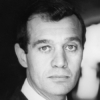Anatole Broyard

Anatole Broyard
Anatole Paul Broyardwas an American writer, literary critic and editor born in New Orleans who wrote for The New York Times. In addition to his many reviews and columns, he published short stories, essays, and two books during his lifetime. His autobiographical works, Intoxicated by My Illnessand Kafka Was the Rage: A Greenwich Village Memoir, were published after his death. He had moved to Brooklyn, New York with his family as a youth...
NationalityAmerican
ProfessionNovelist
Date of Birth16 July 1920
CountryUnited States of America
Anatole Broyard quotes about
We don't simply read books. We become them.
A book is meant not only to be read, but to haunt you, to importune you like a lover or a parent, to be in your teeth like a piece of gristle.
Sometimes it seems that we might have been happier if we had once had an aristocracy to blame everything on.
Chic is a convent for unloved women.
I remember a table in BarchesterTowers that had more character than the combined heroes of three recent novels I've read.
An aphorism is a generalization of sorts, and our present-day writers seem more at home with the particular.
When friends stop being frank and useful to each other, the whole world loses some of its radiance.
Sex almost always disappoints me in novels. Everything can be said or done now, and that's what I often find: everything, a feeling of generality or dispersal. But in my experience, true sex is so particular, so peculiar to the person who yearns for it. Only he or she, and no one else, would desire so very much that very person under those circumstances. In fiction, I miss that sense of terrific specificity.
We are all tourists in history, and irony is what we win in wars.
People ... have no idea what a hard job it is for two writers to be friends. Sooner or later you have to talk about each other's work.
Paranoids are the only ones who notice things anymore.
The moment a book is lent I begin to miss it.
I feel about lending a book the way most fathers feel about their daughters living with a man out of wedlock.
The first divorce in the world may have been a tragedy, but the hundred-millionth is not necessarily one.